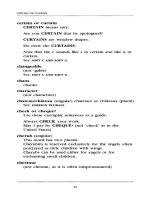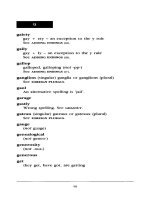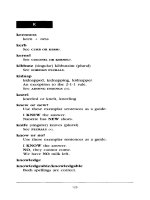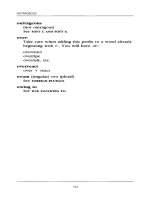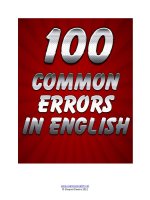common errors in english_7 ppt
Bạn đang xem bản rút gọn của tài liệu. Xem và tải ngay bản đầy đủ của tài liệu tại đây (635.25 KB, 27 trang )
OUTRAGEOUS
outrageous
(not outragous)
See
SOFT
c
AND
SOFT
G.
over-
Take care when adding this
prefix
to a
word
already
beginning with
r You
will have
-rr-:
overreact
overripe
overrule,
etc.
overreact
over
+
react
ovum
(singular)
ova
(plural)
See
FOREIGN
PLURALS.
owing
to
See DUE
TO/OWING
TO.
152
packed
We
took
a
pack lunch with
us.
We
took
a
PACKED
lunch with
us.
paid
(exception
to the -y
rule;
not
payed)
See
ADDING ENDINGS
(iii).
paiment
Wrong spelling.
See
PAYMENT.
pajamas
American
spelling.
See
PYJAMAS.
palate,
palette,
pallet
PALATE
= the top
part
of the
inside
of
your mouth
PALETTE
= a
small board with
a
hole
for the
thumb
which
an
artist uses when mixing paints
PALLET
= a
platform used
to
lift
and to
carry
goods
panic
panicked, panicking, panicky
See
SOFT
c
AND
SOFT
G.
paparazzo
(singular) paparazzi (plural)
See
FOREIGN
PLURALS.
paraffin
paragraphing
There
is no
mystery about paragraphing although
many
students
find it
difficult
to
know when
to end
one
paragraph
and
begin another.
A
paragraph develops
a
particular
point
that
is
relevant
to the
overall
subject.
If you
wish
to
write
a
letter
or an
essay that develops
five or six
points,
then each point will have
its own
paragraph
and you
will
add two
more,
one by way of an
introductory
153
^•^H
PARAGRAPHING
paragraph
and
another
at the end as a
conclusion.
There
are no
rules about
how
long
a
paragraph
should
be.
Some paragraphs,
often
the
introduction
or the
conclusion,
may be a
single sentence; other
paragraphs
may be a
page
or
more long.
Too
many
short paragraphs
in
succession
can be
very
jerky;
too
many
very long ones
can
look forbidding.
It is
best
to mix
long
and
short paragraphs,
if you
can.
You
may
also
find
that
a
paragraph which
is
becoming very long
(a
page
or
more) will
benefit
from
being subdivided.
The
topic
of the
paragraph
may
be
more sensibly developed
as two or
three
subsidiary
points.
Clear
paragraphing
is not
possible without clear
thinking. Think
of
what
you
want
to say
before
you
begin
to
write.
List
the
topics
or
points
you
want
to
make
in a
sensible
order.
Then develop each
one in
turn
in a
separate paragraph.
A
paragraph
usually
contains within
it one
sentence which sums
up its
topic.
Sometimes
the
paragraph will begin
with
this sentence (called
a
topic sentence)
and the
rest
of the
paragraph will
elaborate
or
illustrate
the
point
made. Sometimes
the
topic sentence occurs during
the
paragraph.
It can be
effective,
from
time
to
time,
to
build
up to the
topic
sentence
as the
last sentence
in a
paragraph.
Careful
writers will
try to
move smoothly
from
one
paragraph
to the
next, using link words
or
phrases such
as: on the
other hand; however;
in
conclusion.
In
handwriting
and in
typing,
it is
usual
to
mark
the
beginning
of a
paragraph either
by
indenting
it
by
2cm or so, or by
leaving
a
clear line between
paragraphs.
The
only disadvantage
of the
latter
method
is
that
it is not
always clear, when
a
sentence begins
on a new
page, whether
a new
paragraph
is
also intended.
154
PARTICIPLES
Compare also
the
paragraphing
of
speech.
See
INVERTED COMMAS.
paralyse/paralyze
Both
spellings
are
correct.
paralysis
paraphernalia
parent
(not
perant)
parenthesis
(singular) parentheses (plural)
See
FOREIGN PLURALS.
parliament
parliamentary
parrafin
Wrong spelling.
See
PARAFFIN.
partake
or
participate?
PARTAKE
= to
share
with
others (especially food
and
drink)
PARTICIPATE
= to
join
in an
activity;
to
play
a
part
in
They
PARTOOK
solemnly
of
lamb, herbs
and
salt.
Will
you be
able
to
PARTICIPATE
in the firm's
pension
scheme?
partener
Wrong spelling.
See
PARTNER.
participles
Participles
help
to
complete some tenses.
Present
participles
end in
-ing:
I
am
COOKING
They
were
WASHING.
You
would have been
CELEBRATING.
155
PARTICLE
Past
participles generally
end in -d or -ed but
there
are
many exceptions:
I
have
LABOURED.
You are
AMAZED.
It was
HEARD.
We
should have been
INFORMED.
Care
needs
to be
taken with
the
irregular forms
of
the
past participle. They
can be
checked with
a
good
dictionary.
to
choose chosen
to
teach taught
to
begin begun
The
past
participle
is the
word
that
completes
the
construction:
having
been
?
Participles
can
also
be
used
as
verbal adjectives (that
is,
as
describing words with
a lot of
activity
suggested):
a
HOWLING
baby
a
DESECRATED
grave
As
verbal adjectives, they
can
begin sentences:
HOWLING
loudly,
the
baby woke everyone
up.
DESECRATED
with
graffiti,
the
tombstone
was a sad
sight.
Take
care that
the
verbal adjective describes
an
appropriate noun
or
pronoun.
A
mismatch
can
result
in
unintended hilarity.
See
AMBIGUITY
(v).
particle
particular
156
PEDAL
OR
PEDDLE?
particularly
particular
+
ly
partner
(not
partener)
passed
or
past?
Use
these exemplar sentences
as a
guide:
You
PASSED
me
twice
in
town yesterday.
In
the
PAST,
women
had few
rights.
In
PAST times, women
had few
rights.
I
walk
PAST
your house every day.
passenger
(not
passanger)
past
See
PASSED
OR
PAST?.
pastime
(not -tt-)
payed
Wrong
spelling.
See
PAID.
payment
(not
paiment)
See
ADDING ENDINGS (Hi).
peace
or
piece?
There were twenty-one years
of
PEACE
between
the
two
wars.
Would
you
like
a
PIECE
of
pie?
peculiar
(not
perc-)
pedal
or
peddle?
a
PEDAL
= a
lever
you
work with your foot
PEDDLE
= to
sell (especially drugs)
157
PENICILLIN
penicillin
peninsula
or
peninsular?
PENINSULA
is a
noun meaning
a
narrow piece
of
land jutting
out
from
the
mainland into
the
sea.
It is
derived
from
two
Latin
words:
paene
(almost)
and
insula (island).
Have
you
ever camped
on the
Lizard
PENINSULA?
PENINSULAR
is an
adjective, derived
from
the
noun:
The
PENINSULAR
War
(1808-1814)
was
fought
on
the
Iberian
PENINSULA
between
the
French
and the
British.
Note
It may be
useful
in a
quiz
to
know that
the
P&O
shipping line
was in
1837
The
Peninsular Steam
Navigation
Company
(it
operated between Britain
and
the
Iberian Peninsula).
In
1840, when
its
operation
was
extended
to
Egypt,
it
became
the
Peninsular
and
Oriental Steam Navigation Company (hence P&O).
people
(not
peple)
perant
Wrong spelling.
See
PARENT.
per
cent
(two words)
percentage
(one word)
perculiar
Wrong spelling.
See
PECULIAR.
perhaps
(not
prehaps)
period
(not
pieriod)
158
PICNIC
permanent
(not -ant)
permissible
perseverance
(not
perser-)
personal
or
personnel?
Sarah
has
taken
all her
PERSONAL
belongings with
her.
She
was
upset
by a
barrage
of
PERSONAL
remarks.
All
the
PERSONNEL
will
be
trained
in first
aid.
Write
to the
PERSONNEL
officer
and see if a
vacancy
is
coming
up.
(Note
the
spelling
of
personnel
with
-nn-)
Note
Personnel
Officers
are now
often called Human
Resources
Officers.
perspicacity
or
perspicuity?
PERSPICACITY
=
discernment, shrewdness,
clearness
of
understanding
PERSPICUITY
=
lucidity, clearness
of
expression
phenomenon
(singular) phenomena (plural)
See
FOREIGN PLURALS.
physical
physically
physique
Piccadilly
piccalilli
picnic
picnicked, picnicking, picnicker
See
SOFT
c
AND
SOFT
G.
159
PIECE
piece
See
PEACE
OR
PIECE?.
pieriod
Wrong spelling.
See
PERIOD.
pigmy/pygmy
(singular) pigmies/pygmies (plural)
pining
or
pinning?
pine
+ing
=
pining
pin + ing =
pinning
See
ADDING
ENDINGS
(i),
(ii).
plateau
(singular) plateaus
or
plateaux (plural)
See
FOREIGN
PLURALS.
plausible
pleasant
(not
plesant)
pleasure
plural
See
SINGULAR
OR
PLURAL?.
plurals
(i)
Most
words form their plural
by
adding
-s:
door
doors;
word
words;
bag
bags;
rainbow
rainbows; shop shops;
car
cars
(ii)
Words ending
in a
sibilant
(a
hissing sound)
add
-es
to
form their plural. This adds
a
syllable
to
their pronunciation
and so you can
always hear
when this
has
happened:
bus
buses;
box
boxes;
fez
fezes/fezzes;
bench
benches; bush bushes; hutch hutches.
(iii)
Words ending
in -y are a
special case. Look
at
the
letter that precedes
the final -y. If the
word
ends
in
vowel
+ y,
just
add -s to
form
the
plural
(vowels:
a, e, i, o, u):
160
day
days
donkey donkeys
boy
boys
guy
guys
If
the
word
ends
in
consonant
+ y,
change
the
y
to i, and add
-es:
lobby
lobbies
opportunity opportunities
body bodies
century
centuries
This
rule
is
well worth learning
by
heart. There
are
no
exceptions. Remember
an
easy example
as
a
key
like
boy/boys.
(iv)
Words ending
in -o
generally
add -s to
form
the
plural:
piano pianos
banjo
banjos
studio studios
soprano
sopranos
photo
photos
kimono kimonos
There
are
nine exceptions which
add
-es:
domino dominoes
echo echoes
embargo embargoes
hero
heroes
mosquito mosquitoes
no
noes
potato
potatoes
tomato tomatoes
torpedo
torpedoes
About
a
dozen words
can be
either
-s or -es and
so
you'll
be
safe
with these. Interestingly, some
of
these words until recently have required
-es
161
PLURALS
PLURALS
(words like cargo, mango, memento, volcano).
The
trend
is
towards
the
regular
-s
ending
and
some
words
are in a
transitional stage.
(v)
Words ending
in -f and -fe
generally
add -s to
form
the
plural:
roof roofs
cliff cliffs
handkerchief handkerchiefs
carafe
carafes
giraffe
giraffes
There
are
13
exceptions which
end in
-ves
in the
plural.
You can
always hear when this
is the
case,
but
here
is the
complete list
for
reference:
knife/knives;
life/lives; wife/wives;
elf/elves;
self/selves;
shelf/s
helves;
calf/calves;
half/halves;
leaf/leaves;
sheaf/sheaves;
thief/thieves;
loaf/loaves;
wolf/wolves.
Four
words
can be
either
-fs or
-ves:
hoofs/hooves;
scarfs/scarves;
turfs/turves;
wharfs/wharves.
(vi)
Some nouns
are
quite irregular
in the
formation
of
their plural.
Some
words
don't
change:
aircraft,
cannon, bison, cod, deer, sheep, trout
Some
have
a
choice about changing
or
staying
the
same
in the
plural:
buffalo
or
buffaloes
Eskimo
or
Eskimos
Other everyday
words
have very peculiar plurals
which perhaps
we
take
for
granted:
man
men ox
oxen
woman
women
mouse mice
162
POSSIBLE
OR
PROBABLE?
child children louse lice
foot
feet
die
dice
goose
geese
After
goose/geese, mongoose/mongooses seems
very strange
but is
correct.
See
also
FOREIGN PLURALS.
pneumonia
possability
Wrong spelling.
See
POSSIBILITY.
possable
Wrong spelling.
See
POSSIBLE.
possess
possessed, possessing
possession
possessive apostrophes
See
APOSTROPHES
(ii),
(iii).
possessive pronouns
No
apostrophes
are
needed
with possessive
pronouns:
That
is
MINE.
That
is
OURS.
That
is
THINE.
That
is
YOURS.
That
is
HERS.
That
is
THEIRS.
That
is
HIS.
That
is
ITS.
possessor
possibility
possible
(not
-able)
possible
or
probable?
POSSIBLE
=
could happen
PROBABLE
=
very likely
to
happen
163
POTATO
potato
(singular) potatoes (plural)
See
PLURALS
(iv).
practical
or
practicable?
A
PRACTICAL
person
is one who is
good
at
doing
and
making things.
A
PRACTICAL
suggestion
is a
sensible, realistic
one
that
is
likely
to
succeed.
A
PRACTICABLE
suggestion
is
merely
one
that will
work.
The
word
'practicable'
means
'able
to be put
into
practice'.
It
does
not
carry
all the
additional
meanings
of
'practical'.
practice
or
practise?
Use
these exemplar sentences
as a
guide:
PRACTICE
makes perfect.
An
hour's
PRACTICE
every
day
will yield returns.
The
young doctor
has
built
up a
busy
PRACTICE.
In
the
examples above,
'practice'
is a
noun.
You
should
PRACTISE
every day.
PRACTISE
now!
In
these examples,
'practise'
is a
verb.
precede
or
proceed?
PRECEDE
= to go in
front
of
PROCEED
= to
carry
on,
especially
after
having
stopped
prefer
preferred,
preferring, preference
See
ADDING ENDINGS (iv).
prehaps
Wrong
spelling.
See
PERHAPS.
prejudice
(not
predjudice)
164
preparation
prepositions
Prepositions
are
small words like
'by',
'with',
'for',
'to',
which
are
placed before nouns
and
pronouns
to
show
how
they connect with other words
in the
sentence:
They
gave
the
flowers
TO
their mother.
Let
him sit
NEAR
you.
Two
problems
can
arise with prepositions.
(i)
Take care
to
choose
the
correct preposition.
A
good dictionary will help
you:
comply
with
protest
at
deficient
in
ignorant
of
similar
to, and so on.
(ii)
Don't take
too
seriously
the
oft-repeated advice
not to end a
sentence with
a
preposition.
Use
your
discretion,
and
word your sentence
however
it
sounds best
to
you.
Do
you
prefer
the first or the
second sentence
here?
(a)
WITH whom
are
you?
(b)
Who are you
WITH?
Which
do you
prefer
here?
(c)
She's
a
politician
FOR
whom
I
have
a
great
deal
of
respect.
(d)
She's
a
politician
I
have
a
great deal
of
respect
FOR.
present
(not
-ant)
165
PRESENT
PRESUME
presume
See
ASSUME
OR
PRESUME?.
priest
See
EI/IE
SPELLING RULE.
primitive
(not -mat-)
principal
or
principle?
Use
these exemplar sentences
as a
guide:
Rebuilding
the
school
is
their
PRINCIPAL
aim.
(=
chief)
The
PRINCIPAL
announced
the
results.
(=
chief
teacher)
His
guiding
PRINCIPLE
was to
judge
no one
hastily.
(=
moral rule)
privilege
(not
privelege
or
priviledge)
probable
See
POSSIBLE
OR
PROBABLE?.
probably
(not
propably)
procedure
(not
proceedure)
proceed
See
PRECEDE
OR
PROCEED?.
proclaim
proclamation
(not -claim-)
profession
(not
-ff-)
professional
166
PROPHECY
OR
PROPHESY?
professor
profit
profited,
profiting
See
ADDING ENDINGS (iv).
prognosis
See
DIAGNOSIS
OR
PROGNOSIS?.
prognosis
(singular)
prognoses
(plural)
See
FOREIGN
PLURALS.
program
or
programme?
Use
PROGRAM
when referring
to a
computer
program.
Use
PROGRAMME
on all
other occasions.
prominent
(not
-ant)
pronounceable
(not
pronouncable)
See
SOFT
c
AND
SOFT
G.
pronouns
See
I/ME/MYSELF.
See
WHO/WHOM.
See
POSSESSIVE PRONOUNS
pronunciation
(not
pronounciation)
propably
Wrong
spelling.
See
PROBABLY.
propaganda
(not
propo-)
proper
nouns
See
NOUNS.
prophecy
or
prophesy?
These
two
words look very similar
but are
pronounced
differently.
167
PROPOGANDA
The
last syllable
of
PROPHECY
rhymes with
'sea';
the
last syllable
of
PROPHESY
rhymes with
'sigh'.
Use
the
exemplar
sentences
as a
guide:
Most
of us
believed
her
PROPHECY
that
the
world
would
end on 31
December,
(prophecy
= a
noun)
In
the
example above,
you
could substitute
the
noun
'prediction'.
We
all
heard
him
PROPHESY
that
the
world would
end at the
weekend,
(prophesy
= a
verb)
In
the
example above,
you
could substitute
the
verb
'predict'.
propoganda
Wrong
spelling.
See
PROPAGANDA.
protein
See
EI/IE
SPELLING
RULE.
psychiatrist
psychiatry
psychologist
psychology
publicly
(not publically)
punctuation
See
under individual entries:
APOSTROPHES;
BRACKETS;
CAPITAL
LETTERS;
COLONS;
COMMAS;
DASHES;
EXCLAMATION
MARKS;
HYPHENS;
INVERTED
COMMAS;
SEMICOLONS;
QUESTION
MARKS.
See
also
END
STOPS.
pyjamas
(American
English:
pajamas)
168
quarrel
quarrelled, quarrelling
See
ADDING ENDINGS (iv).
quarrelsome
quarter
question
marks
A
question mark
is the
correct
end
stop
for a
question. Note that
it has its own
built-in
full
stop
and
doesn't
require another.
Has
anyone seen
my
glasses?
Note
that indirect questions
do not
require question
marks
because they have become statements
in the
process
and
need
full
stops.
He
asked
if
anyone
had
seen
his
glasses.
See
INDIRECT
SPEECH/REPORTED
SPEECH.
questionnaire
(not -n-)
questions
(direct
and
indirect)
See
QUESTION
MARKS.
See
INDIRECT
SPEECH/REPORTED
SPEECH.
queue
queued,
queuing
or
queueing
quiet
or
quite?
The
children
were
as
QUIET
as
mice,
(quiet
= two
syllables)
You
are
QUITE
right,
(quite
= one
syllable)
quotation
or
quote?
Use
these exemplar sentences
as a
guide:
169
•II
QUOTATION
MARKS
Use
as
many
QUOTATIONS
as you
can.
Use
as
many quotes
as you
can. (quotation
= a
noun)
I
can
QUOTE
the
whole
poem,
(quote
= a
verb)
quotation
marks
See
INVERTED
COMMAS.
170
radiator
(not
-er)
radically
radical
+
ly
radius
(singular) radii
or
radiuses (plural)
See
FOREIGN
PLURALS.
raise
or
rise?
Let
us
look
at
these
two
words
first as
verbs (doing
words):
My
landlord
has
decided
to
RAISE
the
rent.
He
RAISED
the
rent
a
year ago.
He
has
RAISED
the
rent three times
in
four
years.
My
expenses
RISE
all the
time.
They
ROSE
very steeply last year.
They have
RISEN
steadily this year.
Now let us
look
at
them
as
nouns
(a
raise,
a
rise):
You
should
ask
your employer
for a
RISE.
You
should
ask
your employer
for a
RAISE.
An
increase
in
salary
is
called
'a
rise'
in the UK and
'a
raise'
in
America.
raping
or
rapping?
rape
+ ing =
raping
rap + ing =
rapping
See
ADDING ENDINGS (i),
(ii).
rapt
or
wrapped?
RAPT
=
enraptured
(RAPT
in
thought)
WRAPPED
=
enclosed
in
paper
or
soft
material
raspberry
(not
rasberry)
171
^^••^^1
RATABLE/RATEABLE
ratable/rateable
Both
spellings
are
correct.
realise/realize
Both
spellings
are
correct.
really
real
+
ly
reason
reasonable
rebut
or
refute?
REBUT
= to
take
the
opposite
side
in an
argument
REFUTE
= to
prove
an
assertion
or
allegation
to be
wrong
reccomend
Wrong
spelling.
See
RECOMMEND.
receipt
See
EI/IE
SPELLING RULE.
receive
See
EI/IE SPELLING RULE.
recent
or
resent?
RECENT
=
happening
not
long
ago
RESENT
= to
feel
aggrieved
and be
indignant
recipe
recognise/recognize
Both
spellings
are
correct.
recommend
recover
or
re-cover?
Bear
in
mind
the
difference
in
meaning that
the
hyphen makes:
RECOVER
= get
better, regain possession
RE-COVER
= to
cover again
See
HYPHENS
(iv).
172
RELIEF
rediculous
Wrong spelling.
See
RIDICULOUS.
refectory
(not refrectory)
refer
referred, referring, referee,
reference
See
ADDING ENDINGS
(iv).
referee
or
umpire?
REFEREE
=
football, boxing
UMPIRE
=
baseball, cricket, tennis
refrigerator
(abbreviation
=
fridge)
refute
See
REBUT
OR
REFUTE?
regal
or
royal?
REGAL
= fit for a
king
or
queen; resembling
the
behaviour
of a
king
or
queen
ROYAL
=
having
the
status
of a
king
or
queen,
or
being
a
member
of
their
family
regret
regretted, regretting, regrettable, regretful
See
ADDING ENDINGS
(iv).
regretfully
or
regrettably?
REGRETFULLY
=
with regret
REGRETTABLY
-
unfortunately
rehearsal
rehearse
relevant
(not revelant)
relief
See
EI/IE
SPELLING
RULE.
173
REMEMBER
remember
(not
rember)
repellent
or
repulsive?
Both
words mean
'causing
disgust
or
aversion'.
REPULSIVE,
however,
is the
stronger
of the
two;
it
has the
sense
of
causing
'intense
disgust',
even
horror
in
some circumstances.
REPELLENT
can
also
be
used
in the
sense
of
being
able
to
repel
particular pests
(a
mosquito repellent)
and in the
sense
of
being impervious
to
certain
substances
(water-repellent).
repetition
(not
-pit-)
repetitious
or
repetitive?
Both
words
are
derived
from
'repetition'.
Use
REPETITIOUS
when
you
want
to
criticise
something
spoken
or
written
for
containing tedious
and
excessive repetition.
'Repetitious'
is a
derogatory
term.
Use
REPETITIVE
when
you
want
to
make
the
point
that
speech, writing
or an
activity involves
a
certain
amount
of
repetition (e.g. work
on an
assembly line
in a
factory).
'Repetitive'
is a
neutral
word.
reported speech
See
INDIRECT
SPEECH/REPORTED
SPEECH.
representative
repulsive
See
REPELLENT
OR
REPULSIVE?.
resent
See
RECENT
OR
RESENT?.
reservoir
From
'reserve',
(not
resevoir)
174
resistance
reson
Wrong spelling.
See
REASON.
resonable
Wrong spelling.
See
REASONABLE.
responsibility
(not
-ability)
responsible
(not -able)
restaurant
restaurateur
(not
restauranteur)
resuscitate
(not rescusitate)
revelant
Wrong spelling.
See
RELEVANT.
revenge
See
AVENGE
OR
REVENGE?.
reverend
or
reverent?
REVEREND
=
deserving reverence; title
for a
cleric
The
Revd.
C.
Benson
The
Rev.
C.
Benson
REVERENT
=
showing reverence
REVERENT
pilgrims
reversible
(not
-able)
rheumatism
rhubarb
rhyme
175
RHYME
rhythm
ridiculous
(not
rediculous)
The
word comes
from
the
Latin
ridere,
meaning
'to
laugh'.
rigorous
or
vigorous?
RIGOROUS
=
exhaustive, very thorough, exacting
physically
or
mentally
VIGOROUS
=
full
of
energy
robing
or
robbing?
robe
+ ing =
robing
rob + ing =
robbing
See
ADDING ENDINGS
(i) and
(ii).
rococo
Romania/Rumania
Both
spellings
are
correct.
A
third variant,
Roumania,
is now
considered
old-
fashioned
and
should
be
avoided.
roof
(singular) roofs (plural)
(not
rooves)
royal
See
REGAL
OR
ROYAL?.
176
RHYTHM





